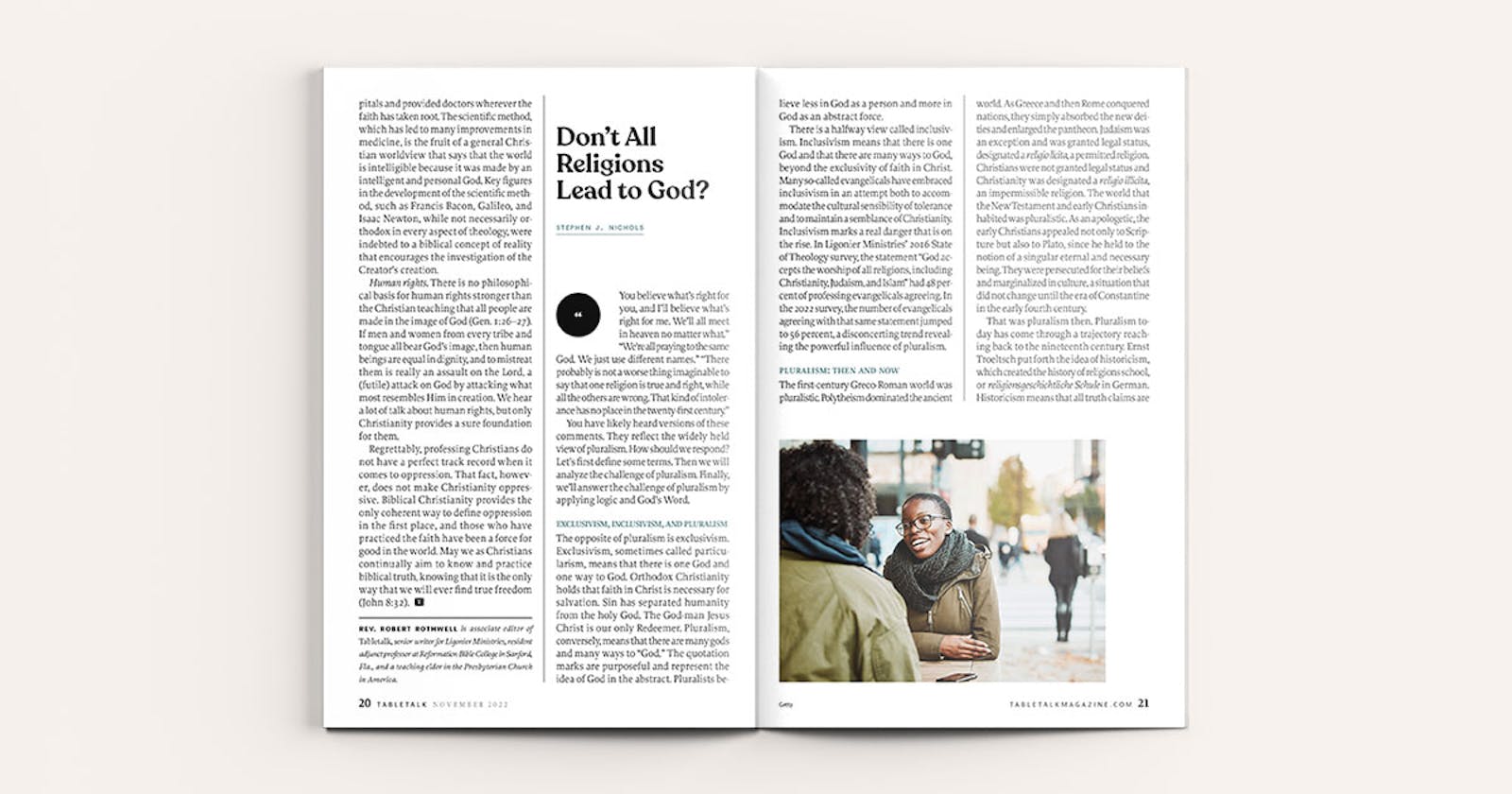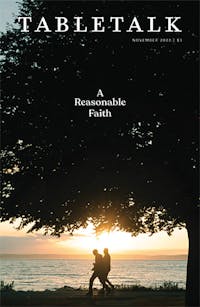
Request your free, three-month trial to Tabletalk magazine. You’ll receive the print issue monthly and gain immediate digital access to decades of archives. This trial is risk-free. No credit card required.
Try Tabletalk NowAlready receive Tabletalk magazine every month?
Verify your email address to gain unlimited access.
“You believe what’s right for you, and I’ll believe what’s right for me. We’ll all meet in heaven no matter what.” “We’re all praying to the same God. We just use different names.” “There probably is not a worse thing imaginable to say than that one religion is true and right, while all the others are wrong. That kind of intolerance has no place in the twenty-first century.”
You have likely heard versions of these comments. They reflect the widely held view of pluralism. How should we respond? Let’s first define some terms. Then we will analyze the challenge of pluralism. Finally, we’ll answer the challenge of pluralism by applying logic and God’s Word.
exclusivism, inclusivism, and pluralism
The opposite of pluralism is exclusivism. Exclusivism, sometimes called particularism, means that there is one God and one way to God. Orthodox Christianity holds that faith in Christ is necessary for salvation. Sin has separated humanity from the holy God. The God-man Jesus Christ is our only Redeemer. Pluralism, conversely, means that there are many gods and many ways to “God.” The quotation marks are purposeful and represent the idea of God in the abstract. Pluralists believe less in God as a person and more in God as an abstract force.
There is a halfway view called inclusivism. Inclusivism means that there is one God and that there are many ways to God, beyond the exclusivity of faith in Christ. Many so-called evangelicals have embraced inclusivism in an attempt both to accommodate the cultural sensibility of tolerance and to maintain a semblance of Christianity. Inclusivism marks a real danger that is on the rise. In Ligonier Ministries’ 2016 State of Theology survey, the statement “God accepts the worship of all religions, including Christianity, Judaism, and Islam” had 48 percent of professing evangelicals agreeing. In the 2022 survey, the number of evangelicals agreeing with that same statement jumped to 56 percent, a disconcerting trend revealing the powerful influence of pluralism.
pluralism: then and now
The first-century Greco-Roman world was pluralistic. Polytheism dominated the ancient world. As Greece and then Rome conquered nations, they simply absorbed the new deities and enlarged the pantheon. Judaism was an exception and was granted legal status, designated a religio licita, a permitted religion. Christians were not granted legal status and Christianity was designated a religio illicita, an impermissible religion. The world that the New Testament and early Christians inhabited was pluralistic. As an apologetic, the early Christians appealed not only to Scripture but also to Plato, since he held to the notion of a singular eternal and necessary being. They were persecuted for their beliefs and marginalized in culture, a situation that did not change until the era of Constantine in the early fourth century.
That was pluralism then. Pluralism today has come through a trajectory reaching back to the nineteenth century. Ernst Troeltsch put forth the idea of historicism, which created the history of religions school, or religionsgeschichtliche Schule in German. Historicism means that all truth claims are historically bound. This view holds that religious truth claims, and religious texts, are not absolute. Instead, all religious texts present the historically and culturally bound ideas of their adherents. Religious beliefs are simply expressions of the longings of human beings. The study of religion, consequently, became a subfield of sociology.
Not long after Troeltsch’s historicism gained a foothold, the philosopher Ludwig Wittgenstein argued that all language, and therefore all knowledge, can never escape its context. He spoke of “language games” (Sprachspiele), making the point that language has meaning only in localized contexts and has no universal import or meaning. As an illustration, consider the game of Monopoly. Monopoly money carries meaning only within the game. You can’t use it to buy groceries or books. Wittgenstein says that this is true of all language. The words we use do not represent eternal, absolute, or abiding realities. They are merely conventions. There are no absolute ideas but only convention and custom, only games.
R.C. Sproul taught us that “ideas have consequences.” That is patently true here. One figure who brought the ideas of historicism and language games to bear on religious pluralism was John Hick. Hick professed an evangelical conversion while a college student but moved further into a pluralist position and through his teaching and writing was a leading missiologist for the mainline church and a significant figure in the philosophy of religion. He argued that the Christian name “God,” the Islamic name “Allah,” and the Jewish name “Jehovah” all refer to the same ultimate Being, what Hick called “The Real.” It would be foolhardy for a Christian to think that the word “God” has meaning for anyone outside the Christian community. He further argued that all religions, including Eastern religions, essentially teach the same message of salvation even though they use different words.
In addition to recognizing the ways that these ideas from philosophers have trickled down, it is also worth noting that we live in an increasingly global world. This has caused many to call for an ethic of civility and tolerance toward those of different cultures that extends to the religious beliefs of other cultures. It is deemed imperialistic or colonialist to see another culture’s religion as false. It is seen as a grave offense, in the present day, to tell someone that his beliefs are wrong. And here we have come full circle to the pluralistic culture of the first century. As the first-century culture persecuted and marginalized Christians for holding beliefs contrary to the culture’s, so Christians today find that the message of the cross is taken as an utterly foolish if not dangerous idea.

If you were to ask Americans, “Don’t all religions lead to God?” fully two-thirds would say yes, based on the responses to the Ligonier State of Theology survey. If you were to ask American evangelicals, a majority, 56 percent, would say yes (see thestateoftheology.com). But the correct answer does not depend on polls. The correct answer depends on what God’s Word says on the matter.
answering pluralism
For pluralism to be true, these different religions need to have similarities and commonalities. They need to be teaching the same things. Do Christianity, Judaism, and Islam teach the same thing on the doctrines of God, Christ, and salvation? Judaism rejects the Trinity, as does Islam. Christianity is at its very core Trinitarian. Judaism rejects Jesus as a false messiah. Islam accepts Jesus as a prophet. Christianity bows before Jesus as the God-man. Judaism believes in a works-righteousness by requiring and following the Mosaic law. Islam defines salvation as submission. Christianity believes in salvation by grace through faith in the work of Jesus Christ alone.
The picture gets even more dissimilar when you compare Christianity with Eastern religious traditions such as Buddhism and Hinduism. Hinduism is pluralistic, but the gods in Hinduism are not actually perceived as the ultimate reality. Ultimate reality is transcendent of all experience and is reached through the reincarnation cycle, moving beyond the realm of the gods. Buddhism has no concept whatsoever of a personal God. Neither Hinduism nor Buddhism teaches that we need an incarnate substitute. In Eastern religions the goal is not salvation but liberation, freedom from reality, or, in the case of Buddhism, freedom from even the distinction between reality and nonreality. Liberation is getting beyond the binary distinction of the real and nonreal. That view is not in any way similar to the view of Judaism or Islam. It is also an absolute contradiction to Christianity.
Pluralism runs contrary to the law of noncontradiction. God cannot be the Trinitarian God and Allah at the same time. The religions of the world do not teach the same thing. They say contradictory things on minor and major points that are essential to each respective religion. We can turn the argument for tolerance on its head. It is very intolerant and disrespectful to these religions to say that they all teach the same thing. It disrespects these religions and their religious texts, doctrines, and adherents.
Pluralism also runs contrary to the plain teaching of Scripture. The Old Testament lays the foundation for our understanding by teaching that God does desire to bring the nations to Himself, but that comes through the witness of His chosen nation, Israel, as seen in the call of Abraham (Gen. 12–18) and in electing Israel (Deut. 7; 10). Moving to the New Testament, Peter declares the exclusivity of Christ in his sermon in Acts 4 (note v. 12) and in the opening chapters of each of his epistles (1 Peter 1:3–12; 2 Peter 1:4, 16–21). Paul is very clear on this issue in Romans 10. Finally, the gospel of John is replete with teaching the exclusivity of Christ (e.g., ch. 1; 3:16; 6:22–71; 20:31). That brings us to the declaration of Jesus in John 14:6. He is the way, the truth, and the life—all in the singular and all with the definite article.
No, all religions do not lead to God. But there is one way that does. The kindest thing we can do for our neighbors is not to offer the false assurance that whatever they believe about God, Christ, and salvation is acceptable. We must tell them that the only way that anyone ever gets into heaven is by Christ alone.
